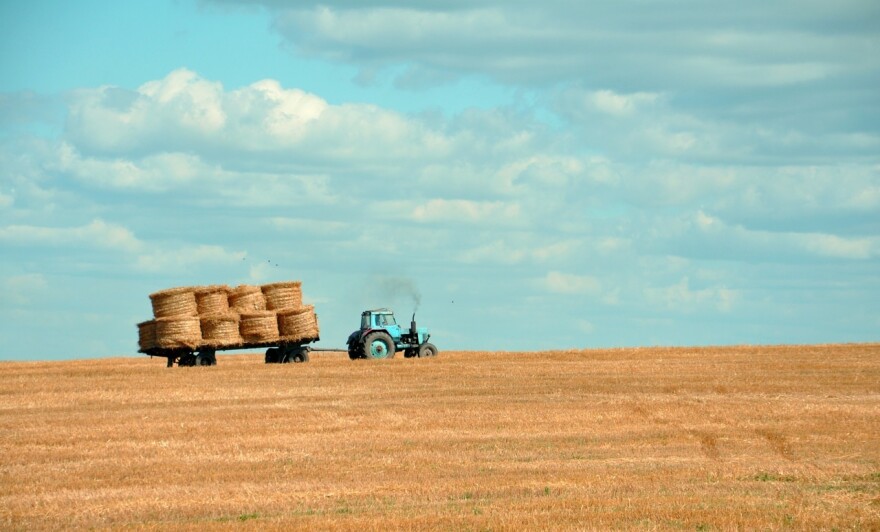Montana, especially rural Montana went big for Donald Trump in the 2016 election, but a lot of farmers and ranchers disagree with him on big, multi-country trade deals. "The free trade agreements, overall, have really benefited agriculture. Every single one of them, really," says Tim McGreevy, a representative for pea, bean and lentil farmers.
He was a panelist at the “agriculture summit” Senator Steve Daines organized in Great Falls this week. It drew more than 700 people.
"Maybe other sectors of the economy have not done so well, but agriculture has done well," McGreevy says.
President Trump is famously hostile to multi-country trade deals like the Trans-Pacific Partnership, or TPP, that the Obama Administration was working on for years. Kent Bacus, who was also on the ag summit trade panel, is with the National Cattleman's Beef Association. He says the TPP got a bad rap.
"The changes that would have been made with TPP was essentially applying U.S. law to other countries," says Bacus. "For the environmental standards, labor standards, it would have raised those throughout Southeast Asia, which are problems that still remain, because we don't have that leverage anymore."
And there's huge money at stake. About 80 percent of Montana's wheat crop is sold to pacific rim countries. Farmers here say TPP would have lowered tariffs those countries put on American wheat, which has to compete with Australia, Russia and Canada, among others.
"For the U.S. beef industry, our top export market is Japan," Bacus says. "Last year we exported $1.5 billion worth of U.S. beef to Japanese consumers. That's with a 38.5 percent tariff in place. Under TPP, we would have seen that tariff phased down to 9 percent. It also would have put us in the same tariff rate level as Australia upon implementation."
So when President Trump's new Agriculture Secretary Sonny Perdue appears in front of an audience of hundreds of Montana farmers and ranchers, he knows he has to reassure them that things are going to be OK, even if his boss doesn't like big international trade deals.
"Trade is vital to American agriculture," says Perdue. "And that's what we're going to focus on. Ladies and gentlemen, I'm a you-grow-it-I-sell-it kind of guy, and that's what we're serious about."
At a brief press conference after his speech, Secretary Perdue said farmers and ranchers should feel good knowing that an experienced businessman and negotiator like Donald Trump is now in charge of U.S. trade policy.
"While the agricultural community thought TPP was a great deal, may be temporarily disappointed, I think they're going to see this administration means business with trade," Perdue says.
And Senator Steve Daines says all the hard work U.S. negotiators put in to drafting a TPP that's good for American farmers isn't necessarily being thrown away, either.
"I think we're in a good position here to take the progress made with ag on TPP, with Japan, specifically in areas like the beef tariffs and move that forward in a bi-lateral agreement," Daines says.
Daines, Ag Secretary Perdue and Senate Agriculture Committee Chairman Pat Roberts who was also in Great Falls for the ag summit all said they think President Trump will be able to negotiate bi-lateral trade deals with individual countries in Asia that are just as good or better than TPP.
"Multi-lateral deals, they can sometimes generate a race to the lowest common denominator," says Daines. "You think about, if you're negotiating on a home, imagine if you're negotiating with 13 parties to get the deal done."
The vice president of the Montana Grain Growers Association says it is possible for the U.S. to negotiate great international trade deals one-on-one with individual countries. But Michelle Erickson Jones says, that needs to start happening fast. She's worried about what's called the TPP-11, that's the 11 countries continuing to try to work out the multi-lateral trade deal after the U.S. pulled out.
"With the bi-lateral agreement, we can get those tariff rates that we want," says Erickson Jones. "We just can't lose the race to sign that bi-lateral agreement if they decide to pursue the TPP-11. We have to be aggressive, but we just need to get back on the world's stage and making sure we are pursuing them aggressively and not letting other countries beat us to signing those agreements."
Erickson Jones, who's a fourth-generation farmer outside Broadview says rural Montana voted overwhelmingly for Trump knowing that he opposed the TPP. She says rural America is unlikely to judge him on a single issue, and that it's pretty hard to tell whether the President will be net good or bad for farm country this early into his term.
Erickson Jones, who's 33, voted libertarian in 2016.
"And I've really struggled with the polarization of U.S. politics," Erickson Jones says. "I'm like a lot of young people, I have a fairly left-leaning social agenda. But, there's quite a bit of the Republican agenda that I'm not really opposed to. I think if most people really sat down that they would find middle ground, and I don't think we do that. I think on social media we yell past each other, and I was really hoping for a candidate that would pull the U.S. back into the center that was a little bit more unifying. I don't know where you find that person now. I don't think that Hillary Clinton was it. I don't think that Donald Trump is it by any means."


